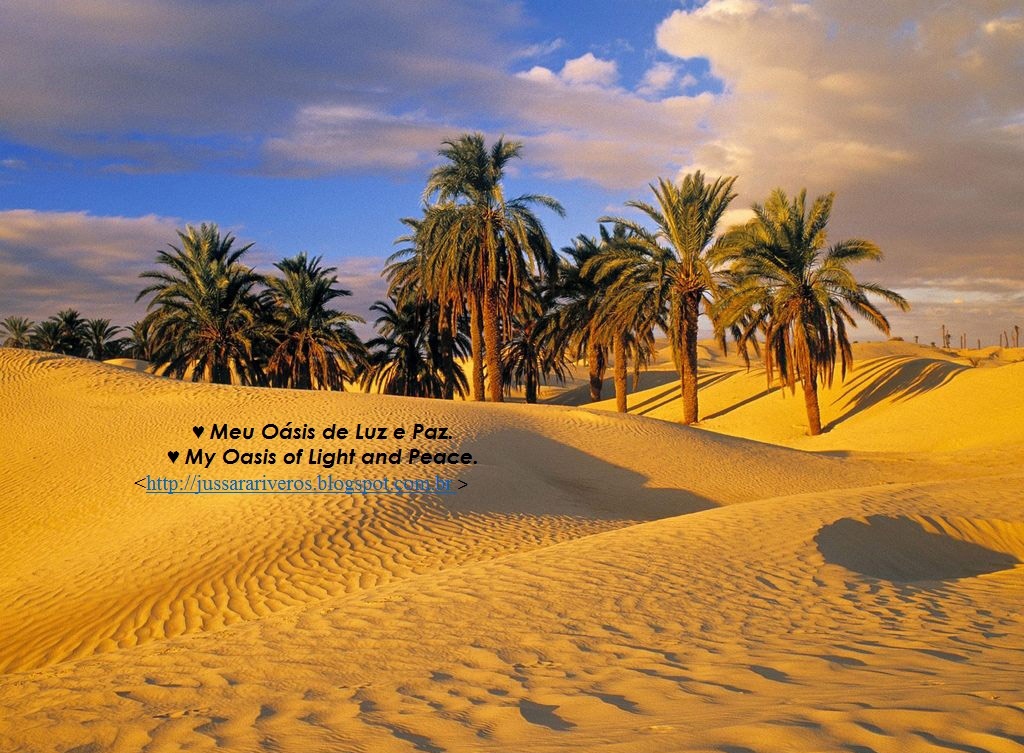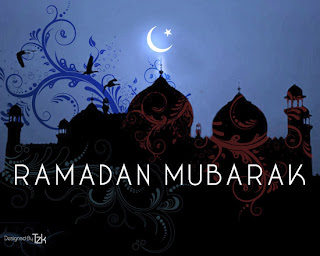Mensagens de Vida♥Life Messages♥Jussara Riveros♥♥Palavras de amor, de fé, de esperança sob a forma de textos, poemas, pensamentos e desejos que transmitam paz para a alma e entre todos os povos, independente de religião, de raça e de costumes ❤❤ Words of love, faith, hope in the form of texts, poems, thoughts and desires, that ttransmit to the soul and peace among all people regardless of religion, race and customs ❤
♥ Meu Oásis de Luz e Paz. ♥ My Oasis of Light and Peace
Meu Oásis / My Oasis

Bem vindo
terça-feira, 9 de julho de 2013
•♥• Feliz Ramadã 2013 ♥• Happy Ramadan 2013
♥•.¸¸.•♥ O feriado comemora quando Deus, através do anjo Gabriel, revelou os primeiros versos do Alcorão, o livro sagrado do Islã, a um comerciante de caravana chamado Muhammad. Os muçulmanos acreditam que o jejum purifica o corpo ea prática lembra do sofrimento dos pobres. Começando aos 12 anos, todos os muçulmanos tomar parte no mês longo jejum do nascer do sol-a-sol, que é a marca do Ramadã. Comer e beber (inclusive água) é proibido durante o dia, e na abstinência do dia é compensado por uma refeição noturna conhecida como iftar. A comida é muitas vezes compartilhada com uma família pobre durante o Ramadã. No final dos 30 dias de jejum é Eid al-Fitr (Festival de quebrar o jejum), quando há muita festa e comemoração.
O Ramadã é o nono mês do calendário islâmico. O Ramadã termo significa literalmente escaldante em árabe. Estabeleceu-se como um mês sagrado para os muçulmanos após o Alcorão foi revelado ao profeta Maomé em 610 dC, por ocasião conhecida como Laylat al-Qadr, freqüentemente traduzido como "a Noite do Poder. ♥•.¸¸.•♥
Como o ciclo do calendário lunar não coincide com o calendário solar, as datas do Ramadã muda por cerca de 11 dias por ano. Em 2011, o Ramadã começou em 1 º de agosto. Em 2012, o Ramadã começou em 20 de julho. Em 2013, o Ramadã está prevista para começar na noite de 08 de julho com o primeiro dia de jejum em 09 de julho. ♥•.¸¸.•♥
O final do Ramadã é marcado pelo feriado de Eid ul-Fitr, que ocorre tanto 29 ou 30 dias após o início do mês. Na Eid ul-Fitr, orações matinais são seguidos por festa e celebração entre família e amigos. Este ano Eid ul-Fitr provavelmente vai cair na quarta-feira 7 de agosto. ♥•.¸¸.•♥
Observância do Ramadã é obrigatório no Alcorão, Surata 2, Ayah 185: ♥•.¸¸.•♥
"O mês de Ramadã [é que] em que foi revelado o Alcorão, orientação para as pessoas e provas claras de orientação e critério. Então, quem mira [a lua nova de] do mês, deixá-lo rápido ele, e quem está doente ou em viagem -, então um número igual de outros dias. Deus quer que você facilidade e não pretende para você as dificuldades e [quer] para que você possa completar o período e para glorificar a Deus, para que [para] que Ele tem guiado você, e talvez você será grato ". ♥•.¸¸.•♥
Durante o mês do Ramadã, a maioria dos muçulmanos jejuam do amanhecer ao pôr do sol, sem comida ou água. Antes do nascer do sol muitos muçulmanos têm o Suhur ou refeição antes do amanhecer. Às famílias do sol e amigos se reúnem para Iftar que é a refeição feita pelos muçulmanos para quebrar o jejum. Muitos muçulmanos começar a refeição comendo por comer, assim como o Profeta costumava fazer. ♥•.¸¸.•♥
Este ritual rápido conhecido como, Sawm, é um dos cinco pilares do Islã, e exige que os indivíduos se abster de comer, beber, fumar e relações sexuais. ♥•.¸¸.•♥
A caridade é uma parte importante do Ramadã. O jejum enfatiza o auto-sacrifício e usando a experiência de fome para crescer em empatia com a fome. Durante o Ramadã, as comunidades muçulmanas trabalham juntos para arrecadar dinheiro para os pobres, doar roupas e alimentos, e mantenha iftar jantares para os menos afortunados. ♥•.¸¸.•♥
Muitos muçulmanos usam o Ramadã para ler todo o Alcorão ou lêem o Alcorão diariamente. Muitas comunidades dividir o Alcorão em segmentos de leitura diária que concluem em Eid ul-Fitr, no final do Ramadã. ♥•.¸¸.•♥
Os não-muçulmanos são livres para participar de Ramadã. Muitos não-muçulmanos jejuam e até mesmo oram com seus amigos muçulmanos ou membros da família. Os não-muçulmanos são freqüentemente convidados a participar da oração e iftar jantares. ♥•.¸¸.•♥
Aqueles que desejam ser educado com alguém que está em jejum para o Ramadã pode cumprimentá-los com Ramadan Mubarak ou Ramadan Kareem, o que significa ter um Ramadan Bendito ou Generoso. ♥•.¸¸.•♥
Em geral, as práticas de Ramadan são destinadas a purificar-se de pensamentos e ações que são contrárias ao Islã. Ao remover desejos materiais, é capaz de se concentrar totalmente em devoção e serviço a Deus. Muitos muçulmanos vão além do ritual físico do jejum e da tentativa de purgar-se de pensamentos impuros e motivações, tais como raiva, xingamento, e ganância. ♥•.¸¸.•♥
O jejum do Ramadã não é obrigatório: para as mulheres grávidas ou amamentando, pessoas que estão gravemente doentes, viajantes, ou em risco de saúde não devem jejuar. As crianças que não passaram pela puberdade também não são obrigados a jejuar durante o mês do Ramadã. ♥•.¸¸.•♥ Jussara Fernandes Riveros ♥•.¸¸.•♥
Pesquisa e fotos da Internet
♥•.¸¸•♥•.¸¸.•♥•.¸¸.•♥•.¸¸.•♥•.¸¸.•♥•.¸¸.•♥
♥•.¸¸.•♥
The holiday honors the time when Allah, via the angel Gabriel, revealed the first verses of the Qur'an, the holy book of Islam, to a caravan trader named Muhammad. Muslims believe that fasting cleanses the body, and the practice reminds them of the suffering of the poor. Beginning at age 12, all Muslims take part in the monthlong sunrise-to-sunset fast that is the hallmark of Ramadan. Eating and drinking (including water) is prohibited during daylight hours, and the day's abstinence is offset by a nightly meal known as iftar. Food is often shared with a poor family during Ramadan. At the end of the 30-day fast is Eid al-Fitr (Festival of Breaking the Fast), when there is much feasting and celebration.
♥•.¸¸.•♥
Ramadan is the 9th month of the Islamic calendar. The term Ramadan literally means scorching in Arabic. It was established as a Holy Month for Muslims after the Quran was revealed to the Prophet Muhammad in 610 CE on the occasion known as Laylat al-Qadr, frequently translated as "the Night of Power.
Observance of Ramadan is mandated in the Quran, Surah2, Ayah l85: ♥•.¸¸.•♥
“The month of Ramadhan [is that] in which was revealed the Qur'an, guidance for the people and clear proofs of guidance and criterion. So whoever sights [the new moon of] the month, let him fast it; and whoever is ill or on a journey - then an equal number of other days. Allah intends for you ease and does not intend for you hardship and [wants] for you to complete the period and to glorify Allah for that [to] which He has guided you; and perhaps you will be grateful.” ♥•.¸¸.•♥
Because the cycle of the lunar calendar does not match the solar calendar, the dates of Ramadan shifts by approximately 11 days each year. In 2011, Ramadan began on August 1st. In 2012 Ramadan began on July 20th. In 2013, Ramadan is expected to begin on the evening of July 8th with the first full day of fasting on July 9th. ♥•.¸¸.•♥
The ending of Ramadan is marked by the holiday of Eid ul-Fitr, which takes place either 29 or 30 days after the beginning of the month. On Eid ul-Fitr, morning prayers are followed by feasting and celebration among family and friends. This year Eid ul-Fitr will most probably fall on Wednesday, August 7. ♥•.¸¸.•♥
During the month of Ramadan, most Muslims fast from dawn to sunset with no food or water. Before sunrise many Muslims have the Suhur or predawn meal. At sunset families and friends gather for Iftar which is the meal eaten by Muslims to break the fast. Many Muslims begin the meal by eating dates as the Prophet used to do.
This ritual fast known as, Sawm, is one of the five pillars of Islam, and requires that individuals abstain from eating, drinking, smoking and sexual intercourse.
Charity is an important part of Ramadan. The fast emphasizes self-sacrifice and using the experience of hunger to grow in empathy with the hungry. During Ramadan, Muslim communities work together to raise money for the poor, donate clothes and food, and hold iftar dinners for the less fortunate. ♥•.¸¸.•♥
Many Muslims use Ramadan to read the entire Quran or read the entire Quran or read the Quran daily. Many communities divide the Quran into daily reading segments that conclude on Eid ul-Fitr at the end of Ramadan. ♥•.¸¸.•♥
Non-Muslims are free to participate in Ramadam. Many non-Muslims fast and even pray with their Muslim friends or family members. Non-Muslims are often invited to attend prayer and iftar dinners. ♥•.¸¸.•♥
Those wishing to be polite to someone who is fasting for Ramadan may greet them with Ramadan Mubarak or Ramadan Kareem, which mean Have a Blessed or Generous Ramadan. ♥•.¸¸.•♥
In general, the practices of Ramadan are meant to purify oneself from thoughts and deeds which are counter to Islam. By removing material desires, one is able to focus fully on devotion and service to God. Many Muslims go beyond the physical ritual of fasting and attempt to purge themselves of impure thoughts and motivations such as anger, cursing, and greed. ♥•.¸¸.•♥
The fast of Ramadan is not obligatory: for pregnant or breastfeeding mothers, people who are seriously sick, travelers, or those at health risk should not fast. Children that have not gone through puberty are also not required to fast during the month Ramadan. ♥•.¸¸.•♥ Jussara Fernandes Riveros♥•.¸¸.•♥
Research carried on the Internet
♥•.¸¸•♥•.¸¸.•♥•.¸¸.•♥•.¸¸.•♥•.¸¸.•♥•.¸¸.•♥
Assinar:
Postagens (Atom)







